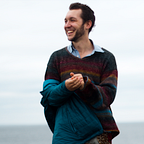Stop waiting for permission to call yourself an artist
I clearly remember reading a sentence in the New York Times two years ago.
It’s rare to be touched this way by an article right? Newspapers are a disposable medium, and the words within them are here-and-gone, given only a moment in the sun before being replaced in the editorial churn. The paper I read is long since in the New York Society Library’s recycling bin. I can’t think of any other newspaper passage that’s stuck with me. But this one has, and that sentence returns to me often.
This article was from a short autobiographical piece by the (excellent) indie rock songwriter Will Sheff, entitled ‘The First Time an Adult Took Me Seriously’. The sentence in question was advice given to a young Sheff by his schoolteacher:
“I think that the next step, for you, is to call yourself an artist, and to understand that you are an artist.”
Sheff’s teacher is offering an immense act of mentorship, and some raw and powerful advice: ‘ I see this in you. It is time to become’.
These words are now worn smooth by my tongue. But when I first read then, they were thorny. It hurt to be read. It held up a mirror to my self-identity, and I realized that I didn’t consider myself an artist. I was an aspiring artist: I was making a podcast, I was making musical instruments, I was travelling and performing. I was dabbling in all of these things, but none of them made me enough money to stop working in bars and offices and warehouses.
I did these things, but I didn’t think they were part of my identity. Because they weren’t how I made my living. I did art, but I had not ‘become’ an artist.
— -
When I graduated from University I invited all my favourite local artists out to coffee. I sat with them one-by-one and asked them about their businesses. Where does the money come from? How do they make it work?
Invariably, their business plans wouldn’t work for my situation. Many of them were into their second career, or were married, or lived rent-free somehow, and had far fewer necessary expenditures than I did. They were older, so their car insurance was cheaper. They had passive and ongoing income sources.
It seemed impossible to make enough as a creative to achieve that escape velocity. In the words of Will Sheff, it seemed like “actual artists lived far away from the practical world, in some realm I’d never escape to.”
But, of course, I was wrong. And here’s why:
Being an artist has never been more accessible.
Art was once the reserve of academies and conservatoires. Until very recently, and by that I mean in the past fifty years or so, to be a creative you needed oil and boards, chisels and marble, organs and orchestras. Both physically and socially, art took place in a very specific place in society: right at the top.
We live in a Promethean age. Just as Prometheus distributed fire, art has been brought from the haute culture and given to the people.
What was once Latin script in high halls is now the go-to tool for resistance. Kwame Braithwaite and Wadsworth Jarrell used portraiture to assert the value of black identity. Ocean Vuong uses poetry to offer the best articulation of intergenerational trauma current accessible. Sculpture and music is a common feature of Extinction Rebellion actions. The fine arts, once exclusively controlled by the colonial class, are a core component of identity building, protest and rebellion. Fine art has been weaponized, the people arming themselves with the iron from their wrists and ankles.
This accessibility has radically changed over the past ten years. Ten years ago, filmmakers used to spend hundreds of thousands of dollars renting cameras, but now we all have one (at least!) in our pockets. Steven Soderbergh’s most recent film was shot on an iPhone. Ten years ago, wannabe radio producers hired studio space. Now every teenager can produce audio with the machines in their bedrooms. Ten years ago, it costs thousands of pounds in tuition to learn an instrument. Now, millions of free resources exist on YouTube and elsewhere.
My grandparents left school, barely literate, at age 12. I grew up 30 miles away from where they did and studied poetry and fine art (compulsorily!) until age 16. There is an abundance of resources online. There has never been a more accessible time to get into the arts.
But here’s the rub: no-one has ever been paid to prove themselves. With the exception of aristocrats (and let’s face it, the independently wealthy still dominate the creative sphere) — everyone cuts their teeth on their own. Creatives come to the profession with proof of their abilities. We are not paid to be trained.
Of course, mentorship is important, and education takes time. My point is that there is a tremendous piece of work inside of you waiting to get out. It’s a piece of work only you can produce, and you are the best person to produce it. It’s almost certain that you have all the tools and resources you need to produce that work at your fingertips already. You have everything you need to get started as a creative. We live in a golden age of access. History has never been kinder to people like you. You just need to give yourself permission to start.
It’s time to call yourself an artist and to understand that you are an artist.
Mark Borthwick is a traditional storyteller based in Edinburgh, Scotland.
